Signs of the Times • 20 May 2016 • No. 73
Special issue
Quotes from early Christian leaders on war and peace
(just in time for Memorial Day)
Editor’s note: My early faith formation training emphasized the urgency of “getting back to the early church” in resistance to encultured Christianity. Of course, what was never mentioned was the early church’s refusal—until the fourth century when Christianity became Rome’s official religion—to wield the sword in defense of the state.
We hope this special issue of “Signs of the Times” will provide needed ballast in the coming Memorial Day season when the altars of warriors’ lives are vested with redemptive national significance.
¶ Processional. “You have to learn how to die / If you want to want to be alive.” —Wilco, “War on War”
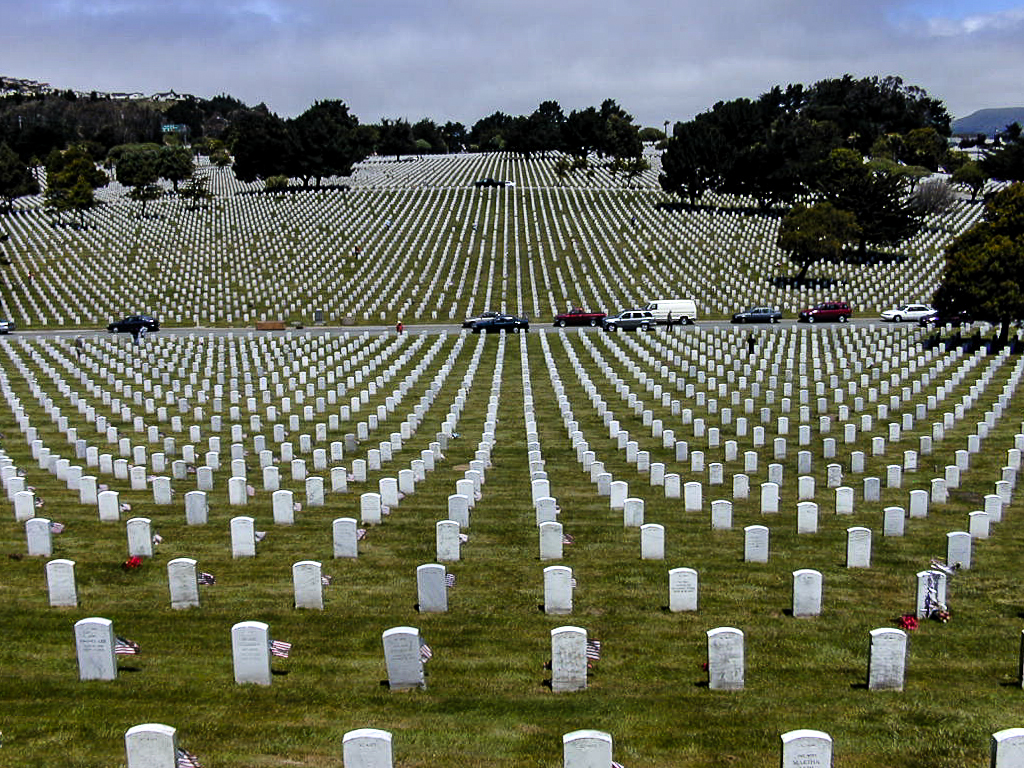
Above: Golden Gate National Cemetary.
¶ Invocation. “I will save them—not by bow, sword or battle, or by horses and horsemen, but by the LORD their God.” — Hosea 1:7
¶ Call to worship. “Some trust in chariots and some in horses, but we trust in the name of the Lord our God.” — Psalm 20:7
¶ Justin the Martyr (100–165 CE)
§ “We ourselves were well conversant with war, murder and everything evil, but all of us throughout the whole  wide earth have traded in our weapons of war. We have exchanged our swords for plowshares, our spears for farm tools . . . now we cultivate the fear of God, justice, kindness, faith, and the expectation of the future given us through the Crucified One.
wide earth have traded in our weapons of war. We have exchanged our swords for plowshares, our spears for farm tools . . . now we cultivate the fear of God, justice, kindness, faith, and the expectation of the future given us through the Crucified One.
§ “The gods of the nations are demons.”
¶ Athenagoras (133–190 CE)
§ “We Christians cannot endure to see a man being put to death, even justly.”
¶ Aristides (written around 137 CE)
§ “It is the Christians, O Emperor, who have sought and found the truth, for they acknowledge God. . . . They show love to their neighbors. They do not do to another what they would not wish to have done to themselves. They speak gently to those who oppress them, and in this way they make them their friends. It has become their passion to do good to their enemies. . . . This, O Emperor, is the rule of life of the Christians, and this is their manner of life.”
¶ The 2nd Epistle of Clement (140–160 CE)
§ “For the Gentiles, hearing from our mouth the words of God, are impressed by their beauty and greatness: then, learning that our works are not worthy of the things we say, they turn to railing, saying that it is some deceitful tale. For when they hear from us that God says: ‘No thanks will be due to you, if ye love only those who love you; but thanks will be due to you, if ye love your enemies and those that hate you’—when they hear this, they are impressed by the overplus of goodness: but when they see that we do not love, not only those who hate us, but even those 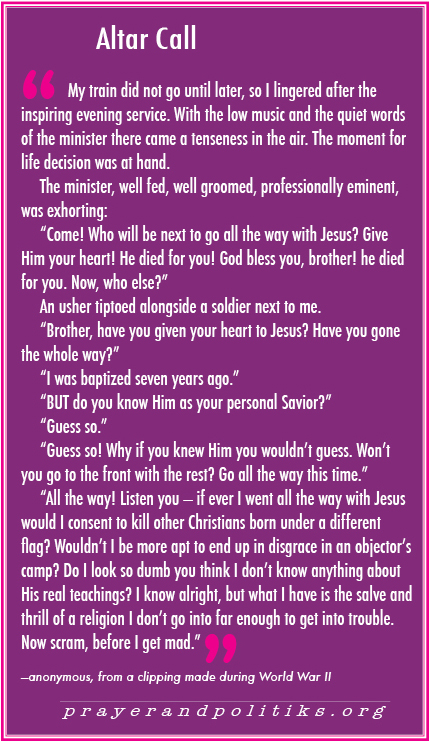 who love us, they laugh at us, and the Name is blasphemed.”
who love us, they laugh at us, and the Name is blasphemed.”
¶ Speratus (martyred 180 CE)
§ “I recognize no empire of this present age.”
¶ Tatian of Assyria (died around 185 CE)
§ “The servants of God do not rely for their protection on material defenses but on the divine Providence.”
¶ Testify. “Everybody is against you war,” exclaims Congolese youth leader Sam Juan. Powerful repudiation by such a young man. (1:12. Thanks Dan.)
¶ Hymn of praise. “Cure your children's warring madness; / bend our pride to your control; / shame our wanton, selfish gladness, / rich in things and poor in soul. / Grant us wisdom, grant us courage, / lest we miss your kingdom's goal.” —Harry Emerson Fosdick, “God of Grace and God of Glory,” performed by Uzee Brown Society of Choraliers
¶ Hymn of intercession. “Prayer for Peace,” Perry Como.
¶ Irenaeus (130–202 CE)
§ “Christians have changed their swords and their lances into instruments of peace, and they know not how to fight.”
¶ Clement of Alexandria (150–214 CE)
§ “The Christian poor are ‘an army without weapons, without war, without bloodshed, without anger, without defilement.’”
§ “Above all Christians are not allowed to correct by violence sinful wrongdoings.”
§ “The soldiers of Christ require neither arms nor spears of iron.”
§ “We Christians are a peaceful race . . . for it is not in war, but in peace, that we are trained.”
§ “If you enroll as one of God’s people, then heaven is your country and God your lawgiver.”

¶ Tertullian (160–220 CE)
§ “Christ, in disarming Peter, disarmed every soldier.”
§ “It is absolutely forbidden to repay evil with evil.”
§ “But now inquiry is being made concerning these issues. First, can any believer enlist in the military? Second, can any soldier, even those of the rank and file or lesser grades who neither engage in pagan sacrifices nor capital punishment, be admitted into the church? No on both counts. . . . How will a Christian engage in war (indeed, how will a Christian even engage in military service during peacetime) without the sword, which the Lord has taken away?”
§ “‘Nation will not take up sword against nation, and they will no more learn to fight.’ Who else, therefore, does this prophecy apply to, other than us?”
§ “The Christian does not hurt even his enemy.”
§ “Only without the sword can the Christian wage war: the Lord has abolished the sword.”
§ “For what war should we not be fit and eager, even though unequal in numbers, we who are so willing to be slaughtered—if, according to that discipline of ours, it was not more lawful to be slain than to slay?”
§ “Shall we carry a flag? It is a rival to Christ.”
§ “Shall it be held lawful to make an occupation of the sword, when the Lord proclaims that he who uses the  sword shall perish by the sword? And shall the son of peace take part in the battle when it does not become him even to sue at law?”
sword shall perish by the sword? And shall the son of peace take part in the battle when it does not become him even to sue at law?”
§ “Learn about the incorruptible King, and know his heroes who never inflict slaughter on the peoples.”
¶ Confession. “There was a war long years ago / All gone, All gone, away my Boys / Our men shipped out to meet the dreaded foe / All gone, away. / They shipped to France and / fought at St. Mihiel / To be baptized by cannon shell. —Garrison Keillor, “Argonne,” song about the historic battle in Argonne (see all the lyrics)
¶ Words of assurance. “Even with darkness sealing us in, / We breathe Your name, / And through all the days that follow so fast, / We trust in You; / Endless Your grace, O endless Your grace, / Beyond all mortal dream.” —Stephen Paulus (from his “The Three Hermits” opera), lyrics by Michael Dennis Browne, adapted from a Russian Orthodox prayer
¶ Hippolytus (170–236 CE)
§ “The professions and trades of those who are going to be accepted into the community must be examined. . . . A military constable must be forbidden to kill, neither may he swear; if he is not willing to follow these instructions, he must be rejected. A proconsul or magistrate who wears the purple and governs by the sword shall give it up or be  rejected. Anyone taking or already baptized who wants to become a soldier shall be sent away, for he has despised God.”
rejected. Anyone taking or already baptized who wants to become a soldier shall be sent away, for he has despised God.”
§ “A person who has accepted the power of killing, or a soldier, may never be received [into the church] at all.”
¶ Origen (185–254 CE)
§ “To those who ask us whence we have come or whom we have for a leader, we say that we have come in accordance with the counsels of Jesus to cut down our warlike and arrogant swords of argument into ploughshares, and we convert into sickles the spears we formerly used in fighting. For we no longer take ‘sword against a nation,’ nor do we learn ‘any more to make war,’ having become sons of peace for the sake of Jesus, who is our leader, instead of following the ancestral customs in which we were strangers to the covenants.”
§ “You cannot demand military service of Christians any more than you can of priests. We do not go forth as soldiers with the Emperor even if he demands this.”
¶ St. Cyprian (200–258 CE)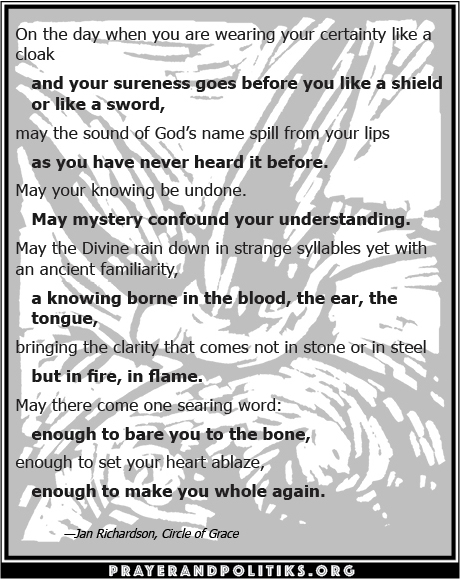
§ “Murder, considered a crime when people commit it singly, is transformed into a virtue when they do it en masse.”
§ “None of us offers resistance when he is seized, or avenges himself for your unjust violence, although our people are numerous and plentiful . . . it is not lawful for us to hate, and so we please God more when we render no requital for injury . . . we repay your hatred with kindness.”
¶ Lactantius, instructor of Constantine’s son (240–320 CE)
§ “For when God forbids us to kill, he not only prohibits us from open violence, which is not even allowed by the public laws, but he warns us against the commission of those beings which are esteemed lawful among men. . . . Therefore, with regard to this precept of God, there ought to be no exception at all, but that it is always unlawful to put to death a man.”
¶ Preach it. “As a minister, he steadfastly refused to mix politics and religion. In the pulpit, he stayed away from issues such as gay rights, abortion, and war, preferring instead to teach what Jesus taught—love your neighbor, help the less fortunate, forgive others because you have been forgiven, and follow God’s laws.” —description of Rev. Schroeder, a character in John Grisham’s novel, The Confession
¶ The Martyrdom of Maximilian (295 CE)
§ Maximilian, a young Numidian, was brought before an African proconsul named Dion in 295 CE for induction into the army. Maximilian refused to join, stating: “I cannot serve as a soldier; I cannot do evil; I am a Christian.” Dion threatened Maximilian, stating: “Get into the service, or it will cost you your life.” With courage, Maximilian did not yield to the threat of death: “I shall not perish, but when I have forsaken this world, my soul shall live with Christ my Lord.” Later he refused the royal badge that had the sign of the emperor on it, saying, “I do not accept your mark, 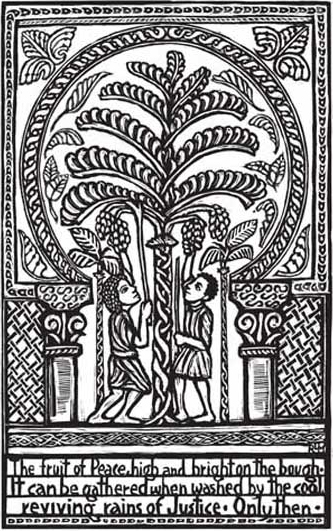 for I already have the sign of Christ, my God. . . . I do not accept the mark of this age, and if you impose it on me, I shall break it, for it is worth nothing.” Maximilian was executed 12 March 295.
for I already have the sign of Christ, my God. . . . I do not accept the mark of this age, and if you impose it on me, I shall break it, for it is worth nothing.” Maximilian was executed 12 March 295.
¶ Call to the table. An inquirer came to Tertullian, an early church leader, and said: "I would be Christian, but after all, I do have to live, don't I?" "Do you?" the old man asked.
¶ Athanasius of Alexandria (293–373 CE)
§ “Christians, instead of arming themselves with swords, extend their hands in prayer.”
Left: Ricardo Levins Morales, ©RLM Art Studio
¶ Marcellus the Centurion as he left the army of Emperor Diocletian (298 CE)
§ “It is not lawful for a Christian to bear arms for any earthly consideration.”
§ “I have led a military life, and am a Roman; and because I am a Christian I have abandoned my profession of a soldier.”
¶ Martin of Tours (315–397 CE)
§ “Hitherto I have served you as a soldier; allow me now to become a soldier to God. Let the man who is to serve you receive your donative. I am a soldier of Christ; it is not permissible for me to fight.”
¶ St. John Chrysostom (347–407 CE)
§ “I am a Christian. He who answers thus has declared everything at once—his country, profession, family; the believer belongs to no city on earth but to the heavenly Jerusalem.”
¶ The Testament of Our Lord (4th or 5th century CE)
§ “If anyone be a soldier or in authority, let him be taught not to oppress or to kill or to rob, or to be angry or to rage and afflict anyone. But let those rations suffice him which are given to him. But if they wish to be baptized in the Lord, let them cease from military service or from the [post of] authority, and if not let them not be received. Let a catechumen or a believer of the people, if he desire to be a soldier, either cease from his intention, or if not let him be rejected. For he hath despised God by his thought, and leaving the things of the Spirit, he hath perfected himself in the flesh and hath treated the faith with contempt.”
¶ Altar call. “Some hands have held the world together / Some hands have fought in wars forever / Tell me what shall I do with these hands of mine.” —“These Hands,” Brother Sun
world together / Some hands have fought in wars forever / Tell me what shall I do with these hands of mine.” —“These Hands,” Brother Sun
¶ Benediction. “If your enemy is hungry, give him food to eat; if he is thirsty, give him water to drink.” — Proverbs 25:21-22
¶ For a long listing of anti-war songs, see this Wikipedia link.
¶ Recessional. “Finally, brethren, after while the battle will be over, for that day when we shall lay down our burdens and study war no more. —Moby, “Study War”
¶ Lectionary for Sunday next. —See the “Midrash on 1 Kings 18:20-21” at right.
# # #
Featured this week on prayer&politiks:
• “Peace, like war, is waged,” a litany for worship adapted from a Walker Knight poem
• “Fear not! The nonviolent war cry of the People of God”
 • “Memorial Day quotes: The minority report,” a collection of quotes on war and peace
• “Memorial Day quotes: The minority report,” a collection of quotes on war and peace
• “Public reasoning and ekklesial reckoning: Commentary on the Vatican conference calling for ‘spirituality and practice of active nonviolence’ to displace church focus on just war”
©Ken Sehested @ prayerandpolitiks.org. Language not otherwise indicated above is that of the editor. Don’t let the “copyright” notice keep you from circulating material you find here (and elsewhere in this site). Reprint permission is hereby granted in advance for noncommercial purposes.
Your comments are always welcomed. If you have news, views, notes or quotes to add to the list above, please do. If you like what you read, pass this along to your friends. You can reach me directly at klsehested@gmail.com.



 wide earth have traded in our weapons of war. We have exchanged our swords for plowshares, our spears for farm tools . . . now we cultivate the fear of God, justice, kindness, faith, and the expectation of the future given us through the Crucified One.
wide earth have traded in our weapons of war. We have exchanged our swords for plowshares, our spears for farm tools . . . now we cultivate the fear of God, justice, kindness, faith, and the expectation of the future given us through the Crucified One. who love us, they laugh at us, and the Name is blasphemed.”
who love us, they laugh at us, and the Name is blasphemed.”
 sword shall perish by the sword? And shall the son of peace take part in the battle when it does not become him even to sue at law?”
sword shall perish by the sword? And shall the son of peace take part in the battle when it does not become him even to sue at law?” rejected. Anyone taking or already baptized who wants to become a soldier shall be sent away, for he has despised God.”
rejected. Anyone taking or already baptized who wants to become a soldier shall be sent away, for he has despised God.”
 for I already have the sign of Christ, my God. . . . I do not accept the mark of this age, and if you impose it on me, I shall break it, for it is worth nothing.” Maximilian was executed 12 March 295.
for I already have the sign of Christ, my God. . . . I do not accept the mark of this age, and if you impose it on me, I shall break it, for it is worth nothing.” Maximilian was executed 12 March 295. world together / Some hands have fought in wars forever / Tell me what shall I do with these hands of mine.” —“
world together / Some hands have fought in wars forever / Tell me what shall I do with these hands of mine.” —“ • “
• “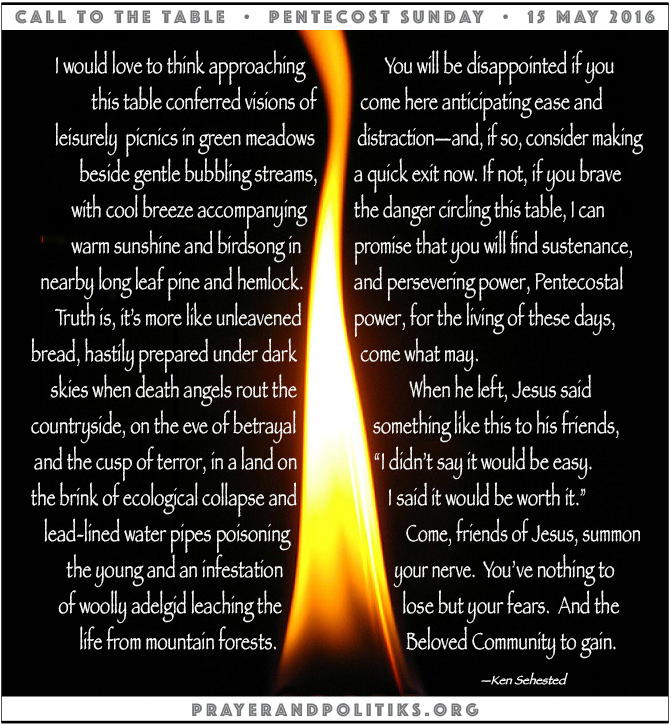
 Today we leave behind the bold drama and bright colors of the church year’s mountain range—Advent to Christmas, Ash Wednesday to Easter, all setting the stage for yesterday’s Pentecostal flames. (See the special artwork at bottom.) Now we descend to the plains of “ordinary” time and muted earth tones.
Today we leave behind the bold drama and bright colors of the church year’s mountain range—Advent to Christmas, Ash Wednesday to Easter, all setting the stage for yesterday’s Pentecostal flames. (See the special artwork at bottom.) Now we descend to the plains of “ordinary” time and muted earth tones.

 Joyce Holliday’s reflections on Berrigan’s life. This week, I recommend
Joyce Holliday’s reflections on Berrigan’s life. This week, I recommend 
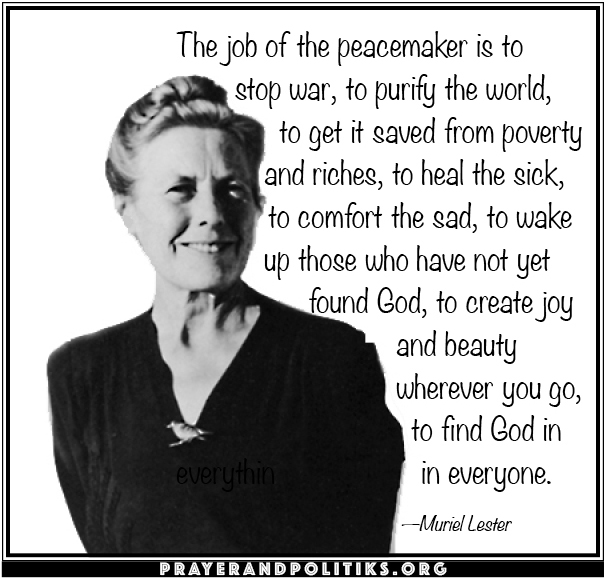 “
“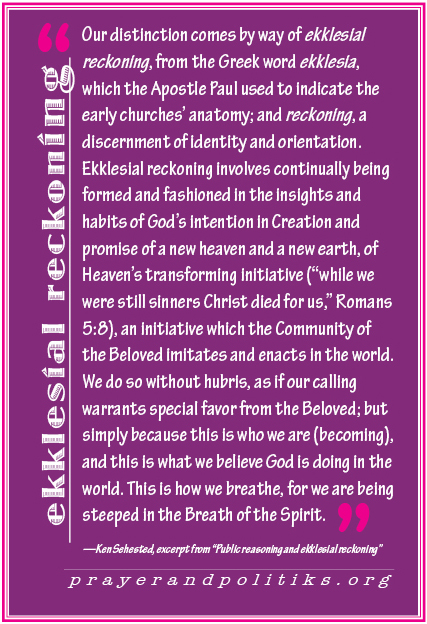 Howard, Liberation or Catastrophy?: Reflections on the History of the 20th Century
Howard, Liberation or Catastrophy?: Reflections on the History of the 20th Century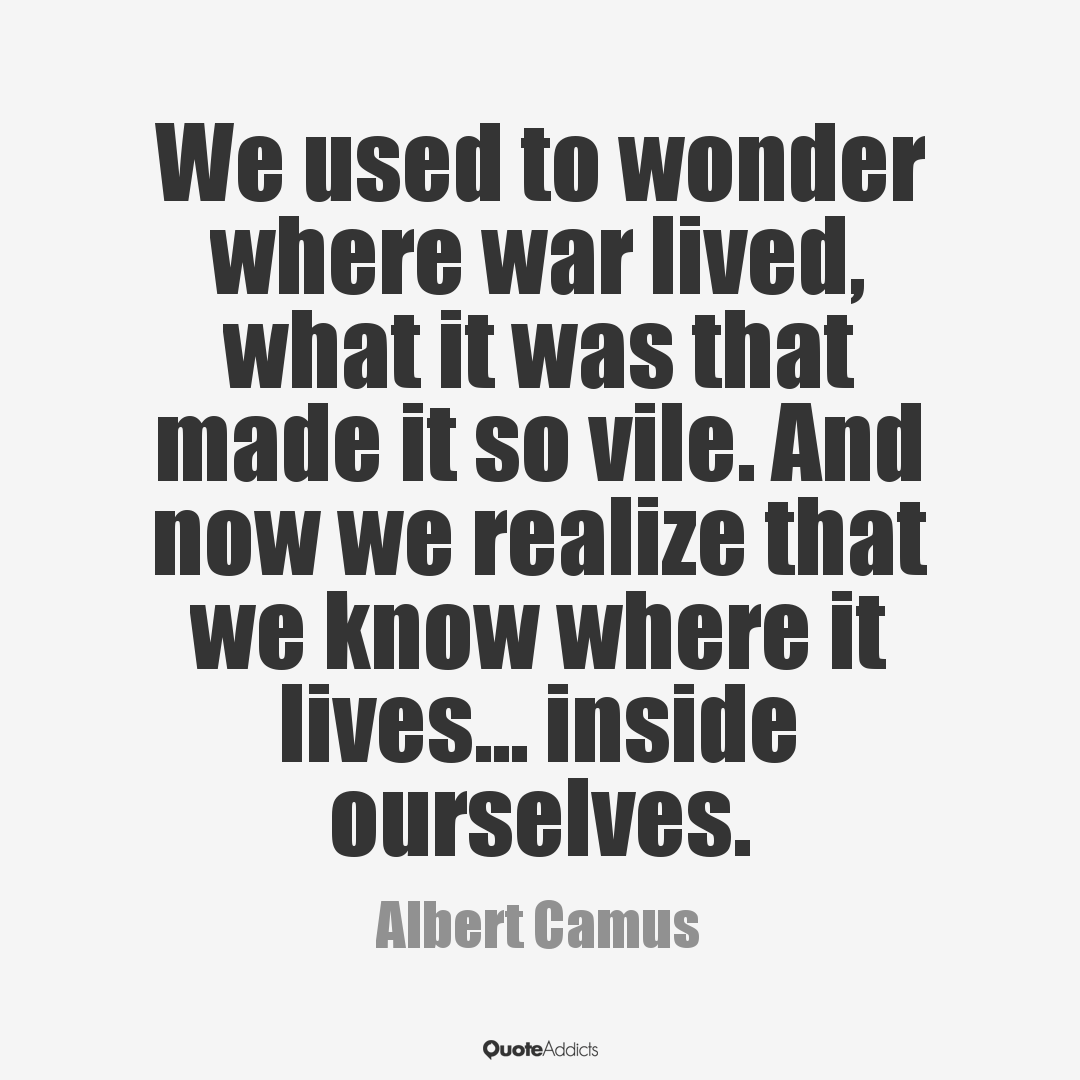 ¶ Show me who makes a profit from war and I will show you how to stop war. —industrialist Henry Ford
¶ Show me who makes a profit from war and I will show you how to stop war. —industrialist Henry Ford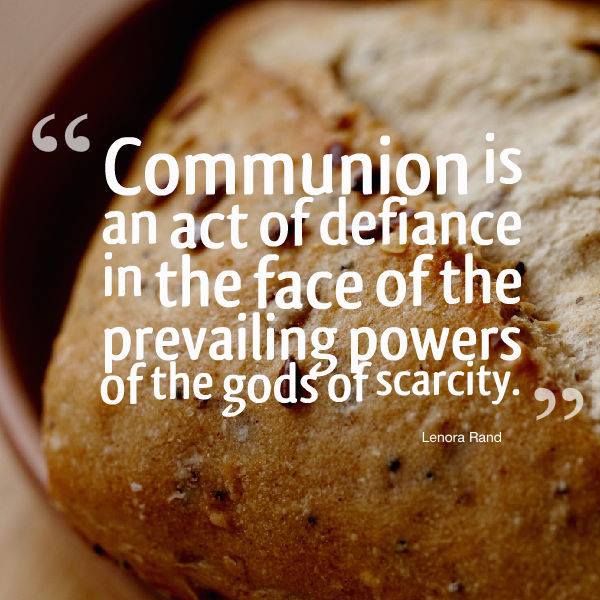 center, the substance and the circumference of our secret power—will our mobilizing lead to something other than exhaustion.” —continue reading Ken’s Sehested’s essay, “
center, the substance and the circumference of our secret power—will our mobilizing lead to something other than exhaustion.” —continue reading Ken’s Sehested’s essay, “ # # #
# # #